Yevhen Mezhevikin, Hero of Ukraine: I've been fighting for over nine years. I don't know what civilian life is. War is our life now
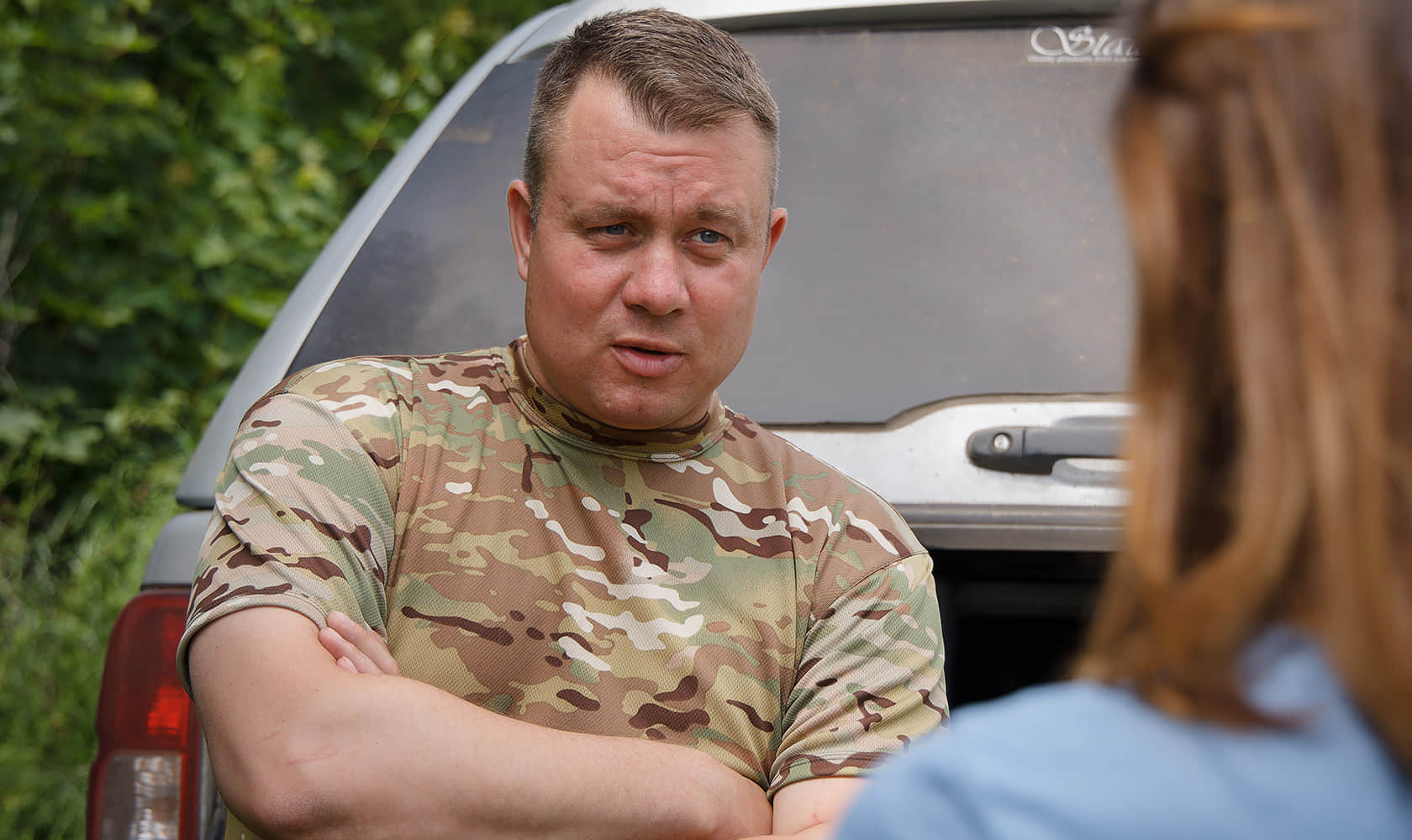
In May 2023, after ten months of heavy defence on the Bakhmut front, the Ukrainian army started offensive actions on both flanks and at the same time withdrew from the long-suffering city.
The defence forces began to successfully "nibble away" at the areas captured by the Russians to the north and south of the city, forcing the Russians to retreat.
This was especially noticeable on the southern flank, where several units managed to push the Russians away from the forest near Ivanivske and some of them crossed the Siverskyi Donets-Donbas canal.
These units are currently commanded by 41-year-old Colonel Yevhen "Adam" Mezhevikin, leader of the Adam joint tactical group and an experienced tank driver who has been awarded the title Hero of Ukraine. Mezhevikin has been at war with Russia since 2014, taking part in the Battle of Donetsk Airport and almost all the hotspots of the full-scale invasion.
Ukrainska Pravda met Yevhen in a frontline town in Donetsk Oblast and we drove to a small field nearby.
Mezhevikin has about an hour to talk, so we try to fit in as many questions as possible. We ask about the offensive on the flanks around Bakhmut, the defence of the city and the reasons for leaving it, Commander-in-Chief Valerii Zaluzhnyi's surprise visits to this front, and the role that Colonel General Oleksandr Syrskyi played in local operations.
Yevhen declines several incoming calls during the conversation, and once, as he’s talking about the defence of the long-suffering city of Bakhmut, he asks us to stop recording.
He gets a little angry at this point. As the commander of the tactical group, he is obviously hurt by the loss of positions by some units.
When he talks about tanks, on the other hand, Yevhen has a broad smile on his face - he’s clearly missing his "field" work very much.
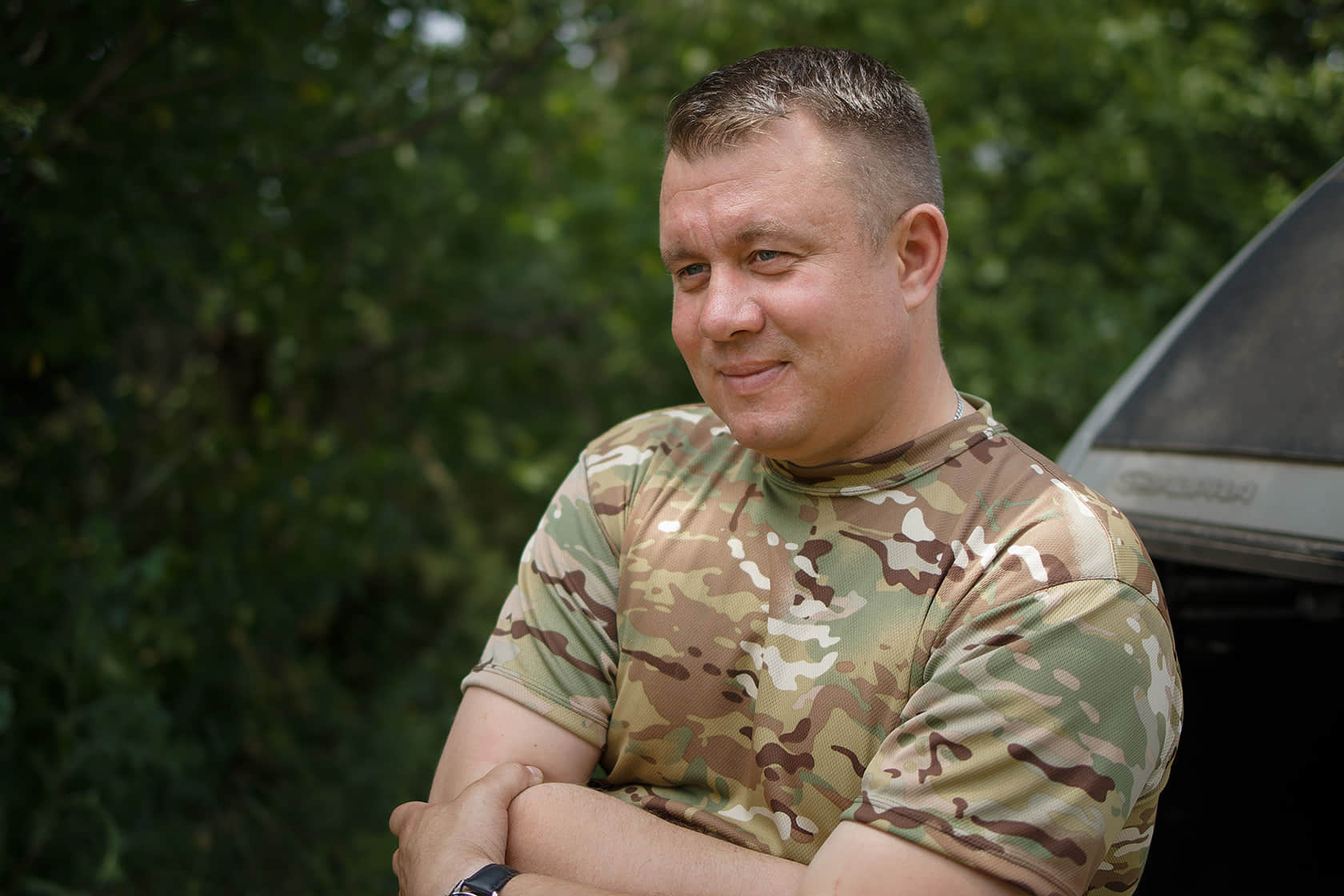
How the offensive is unfolding on the Bakhmut front’s southern flank
Yevhen, let's start with the main topic - the offensive actions on the Bakhmut front. When and how did they start for you?
For me, as leader of the consolidated tactical group, the offensive began much earlier than May.
Because after certain events... When the units south of Bakhmut were retreating, there was a danger that the city might be encircled. The enemy had almost reached the Kostiantynivka-Bakhmut road. I was appointed head of the units that were supposed to stop this advance, inflict damage and further regain the lost position.
Was that around March?
Yes.
Was it the 80th Brigade who were there?
Yes, the 80th and the 5th [the former 5th Assault Regiment - UP], one battalion from each. They entered the zone, replaced the units that had lost combat capability and occupied their lost positions. I don't have to name them, do I?
Throughout our defensive actions, we carried out local offensive actions - assaults and recapturing positions.
By May, we had been able to recapture many of the positions occupied by Wagner Group fighters and had almost completely destroyed one of their assault squads, and this is taking into account its weekly replenishment of 100-200 troops - about one and a half thousand dead.
After the Wagner units lost their offensive potential and went on the defensive, we inflicted damage on them when they were defending and improved our positions. And we did this quite successfully - we were able to push the enemy away from the Bakhmut-Kostiantynivka road and did not allow them to close the encirclement of the city.
Do you mean when you stopped them from crossing the road and going towards Chasiv Yar?
Yes. And we also provided a "road of life" to Bakhmut. All logistics into the city passed through our tactical group, through Ivanivske (a village south of the Kostiantynivka-Bakhmut road - UP), and the task was not only to secure this road but also to create additional routes.
We restored one canal crossing and created two additional ones. Thanks to these moves, the units stationed in Bakhmut were kept supplied.
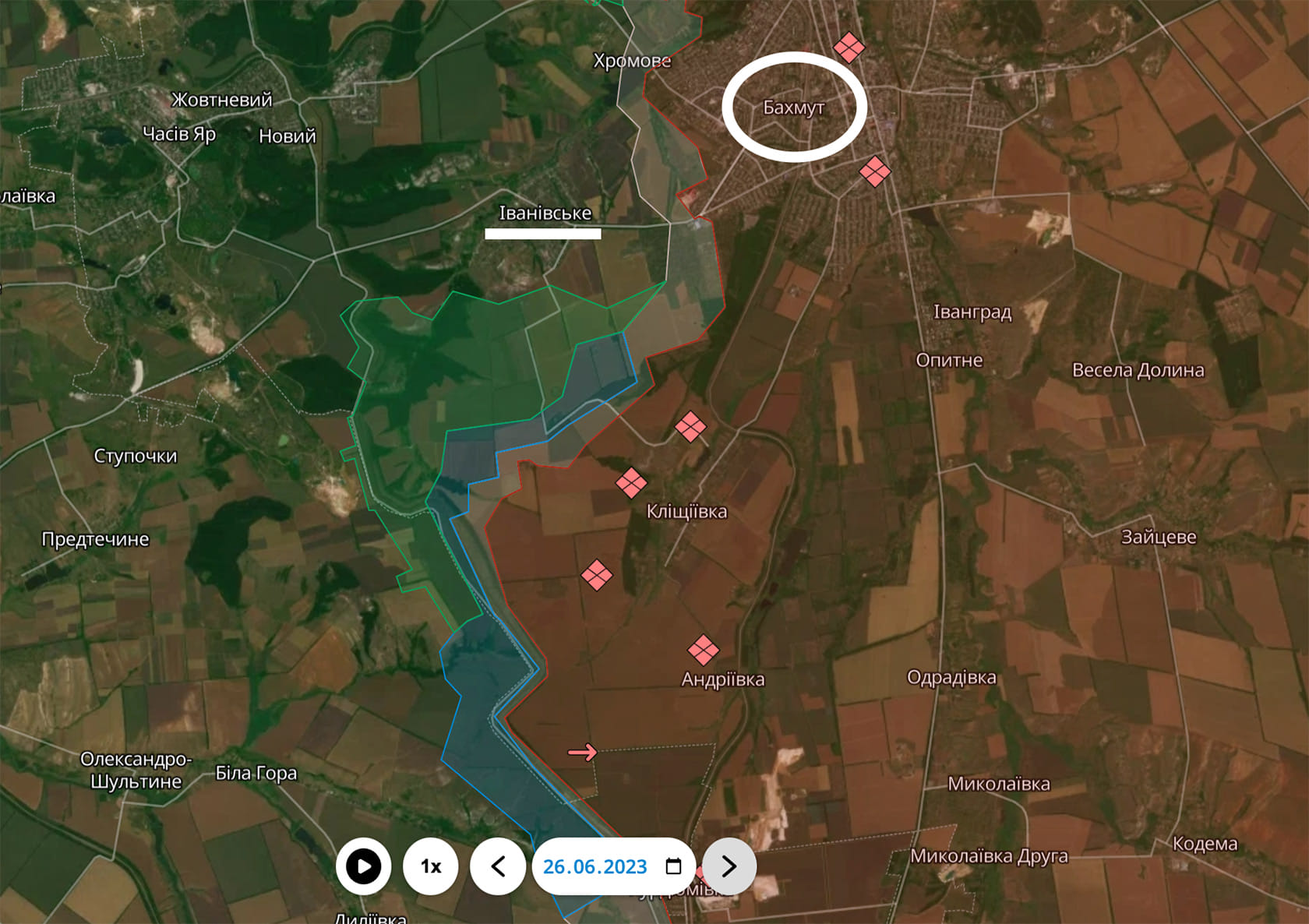
The village of Ivanivske mentioned by Mezhevikin and Bakhmut itself are marked on this map produced by Ukrainian analysts from DeepState
All the units advancing and holding the line on the southern flank of the Bakhmut front are currently under your command, right? The 3rd Assault, 80th and 28th?
... And the 24th, 22nd and 5th. In addition, there are separate territorial defence battalions and separate rifle battalions.
I’m not going to say the total number of people because it could be analysed by the enemy, but our group includes mechanised, assault and airborne units. And Special Operation Forces and artillery.
Let's return to the offensive actions - was there a surge in them in May? That was when the 3rd Assault Division announced that it had forced Russia’s 72nd Motorised Rifle Brigade to retreat near Bakhmut.
I will say this: the 3rd Brigade simply announced what all the units were doing in cooperation. When the 3rd began offensive operations, it was not yet part of the Adam tactical group; it was in the Azov tactical group commanded by Biletskyi. Therefore, he announced these actions in the media and on Telegram channels.
But the 5th and 80th began offensive actions and were more successful. The 80th went deep into the enemy positions; this is a more dangerous direction.
What’s currently happening with the offensive on the southern flank?
It has slowed down because there are measures that must be carried out after an assault - fortification, mine clearance, and setting up logistics routes. And all of that takes time.
Plus, after our offensive, the enemy brought reserves here - a battalion of paratroopers, a battalion of the tank regiment of the 4th Brigade, which replaced the Wagnerites. There have been some difficult battles, but they suffered significant losses.
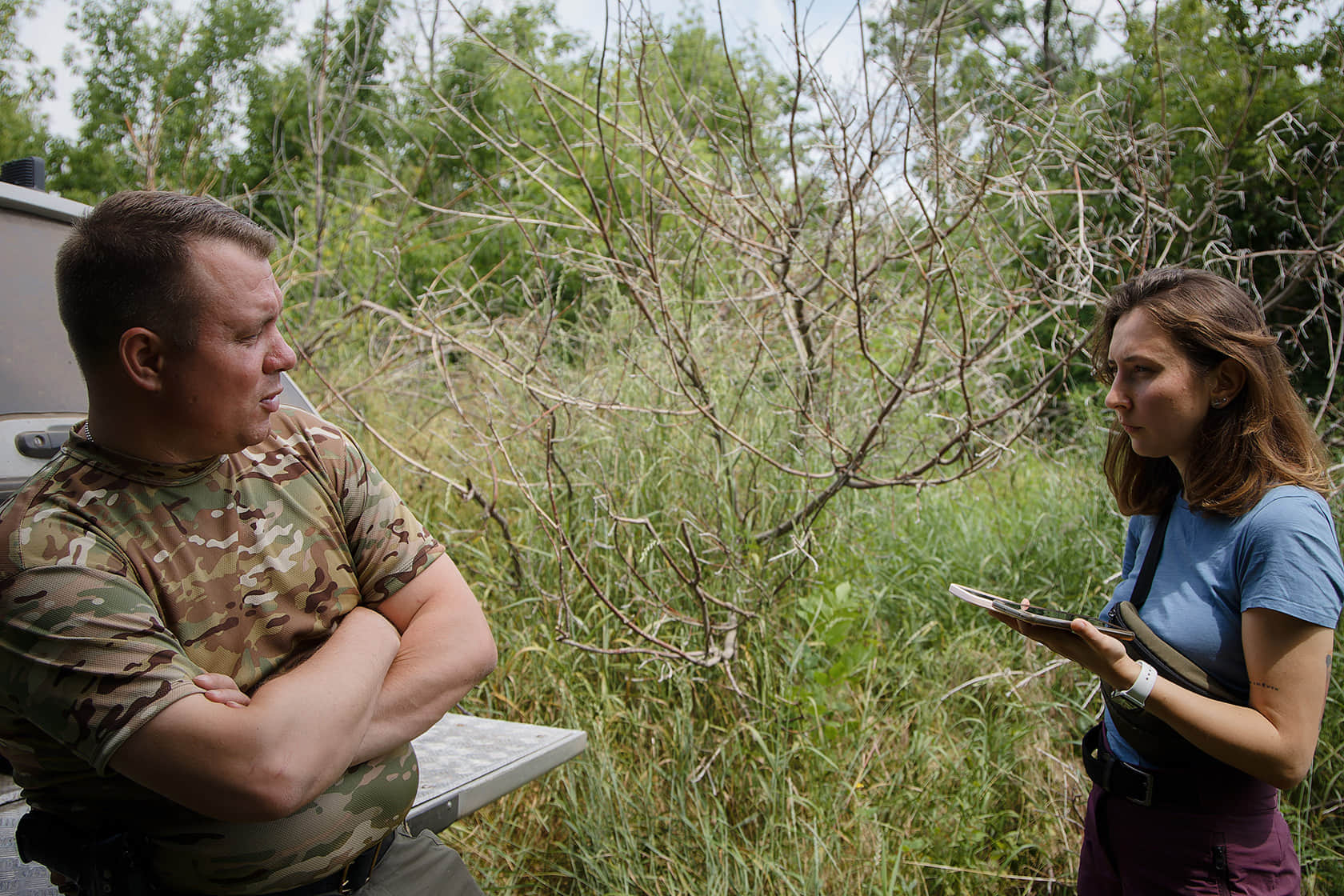
Has Wagner completely withdrawn from the Bakhmut front?
There are no Wagnerites among the PoWs now, and interrogations of other PoWs show that they are not here.
How many Wagnerites did the defence forces kill in ten months of fighting on the Bakhmut front?
In Klishchiivka, for example, during a day of fighting without crazy activity from the enemy, approximately 60-80 of their fighters were killed. On days of active actions, the number would reach a hundred or a couple of hundred. They completely lost their combat capability several times.
They have a hell of a lot of convicts there; the Muscovites [i.e. Russians] don't think of them as people.
One time the 5th Brigade advanced 100 metres along one tree plantation, and there were about seventy bodies buried in that plantation alone. They carried their dead soldiers out for a while, but then it just became impossible.
How far are the defence forces from occupied Klishchiivka and Kurdiumivka?
They have already approached them. From the nearest point to Klishchiivka it’s one and a half kilometres, and Kurdiumivka, which is the dominant height, is now a stone’s throw away. There are only three vantage points there, which provide the enemy with observation as far as the Vuhlehirsk Thermal Power Plant.
The defence of Bakhmut: loss of positions, reasons for leaving the city, Zaluzhnyi and Syrskyi’s roles
Back in March, speaking to The New York Times, you were confident that Ukrainian forces would be able to hold Bakhmut. When has your confidence or faith wavered?
They have never wavered. When Bakhmut began to fall at the beginning of this year, it was predicted that it would be taken over as early as April. I said at the time: nothing will happen in March, nor in April, the defence will last at least until May.
Then The New York Times came back in April and said: "Cool, Bakhmut is still holding, what's your opinion on further actions?" I said: "[It could hold] until a certain date in May, because it was not possible…"
That is, it was possible, but the units had already carried out their main task – they’d inflicted maximum damage on the enemy and reduced its offensive potential. The Wagner Group was withdrawn not because it had done its job and captured the city and they could get some rest. It was because they had completely lost their combat capability.
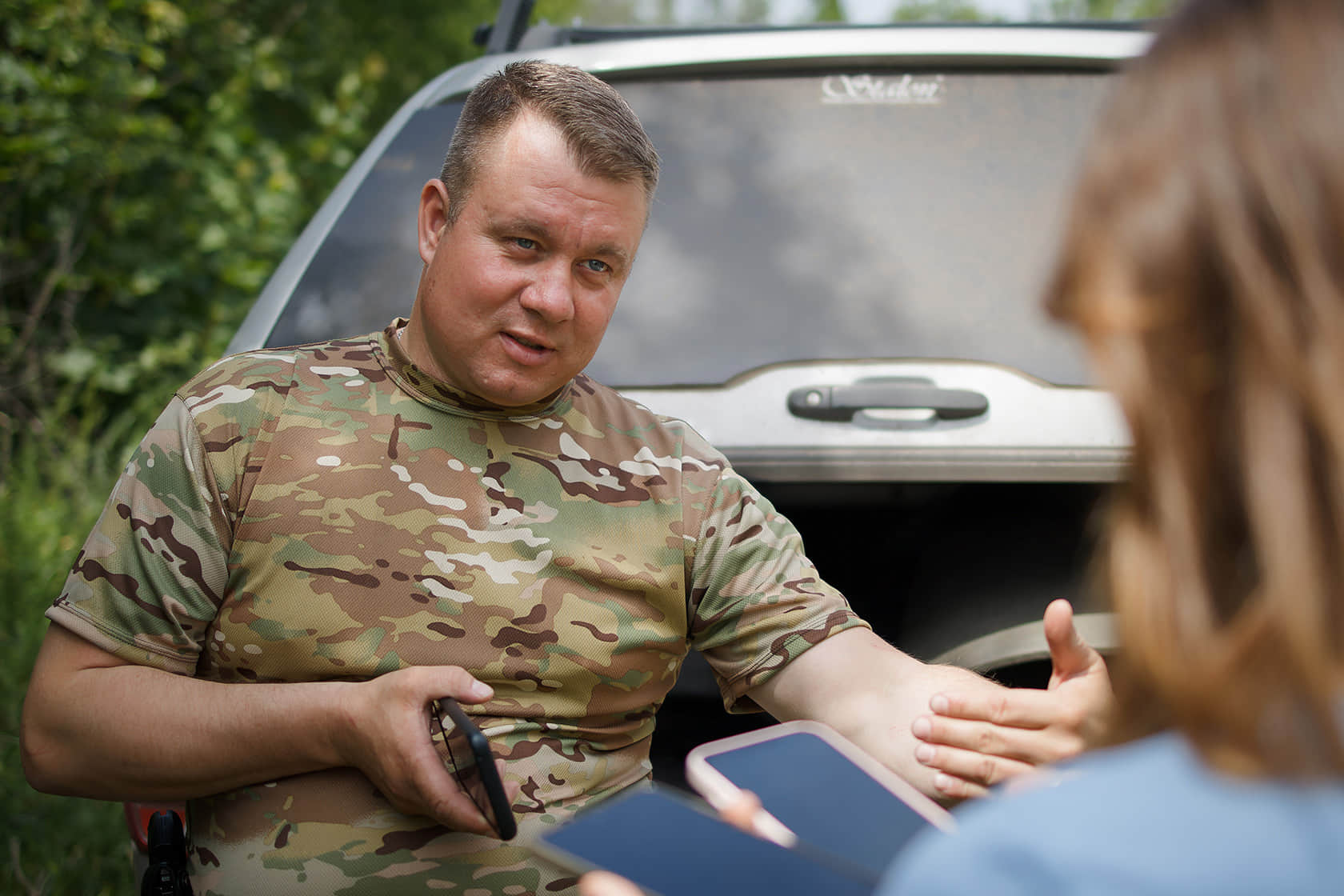
Is the Battle of Bakhmut a victory or a defeat for the Ukrainian army?
Every battle, even if it doesn’t end with the raising of the flag over a particular position, height or settlement, still achieves its objective.
Even if it's a manoeuvrable defence with retreat, which everyone calls a loss of positions, it involves leaving positions with maximum losses to the enemy. And in tactics, this type of battle is quite effective. Therefore, all the battles that took place here can, of course, be considered more of a victory.
What was the key reason why the defence forces had to leave Bakhmut?
There are many reasons. But the main ones are... The abandonment of the city was not the result of any mistakes or miscalculations; no, it was the result of the complication of defence. And this was due to certain actions by our units: some commanders and personnel did not understand the importance of performing their tasks. That's putting it mildly.
Is the bigger problem here with those who set the tasks or those who had to carry them out?
I’d say the personnel were no longer prepared to perform those tasks. And I'm not saying this because I'm a commander and I'm not prepared to talk about the command's mistakes. Much was planned, much was done. But some units were unable to take advantage of it, and some didn’t want to.
And these reports: "Mr President, we are ready to defend our homeland, but without artillery, tanks, training... We are perfect, but everyone else around us is a scumbag, so we are forced to turn around and leave." These people need to be judged unequivocally, and we need to find out why they did this.
The main losses were caused by units like that.
Is it true that some of the soldiers who were stationed in Bakhmut were unable to leave the city in an organised manner?
What do you mean, unable? We did leave. I can speak for my units – the 214th Battalion, part of the 80th and 5th Brigades – we pulled them out of their positions and sent them to Bakhmut as reinforcements.
When they entered the city, they did not lose a single position, they conducted assault operations to regain control of buildings and entrances, and they knocked out the enemy. All of these units came out, apart from those who were killed if, say, they were trapped under the rubble when a building collapsed.
There were such cases, too, and there’s no escaping that.
When Bakhmut is liberated... every commander knows where his men are. This is how it is now: we regained our positions along the canal [the Siverskyi Donets-Donbas canal – ed.] through the forest and managed to pull out the people who were left there last year. Units from the 63rd Brigade, 123rd Battalion and the Special Forces arrived to take over the positions where they had lost personnel.
It will be the same with Bakhmut. We will find everyone and bring them home, although not alive, unfortunately.
Returning to the question: our units left in full force, leaving no one behind in Bakhmut.
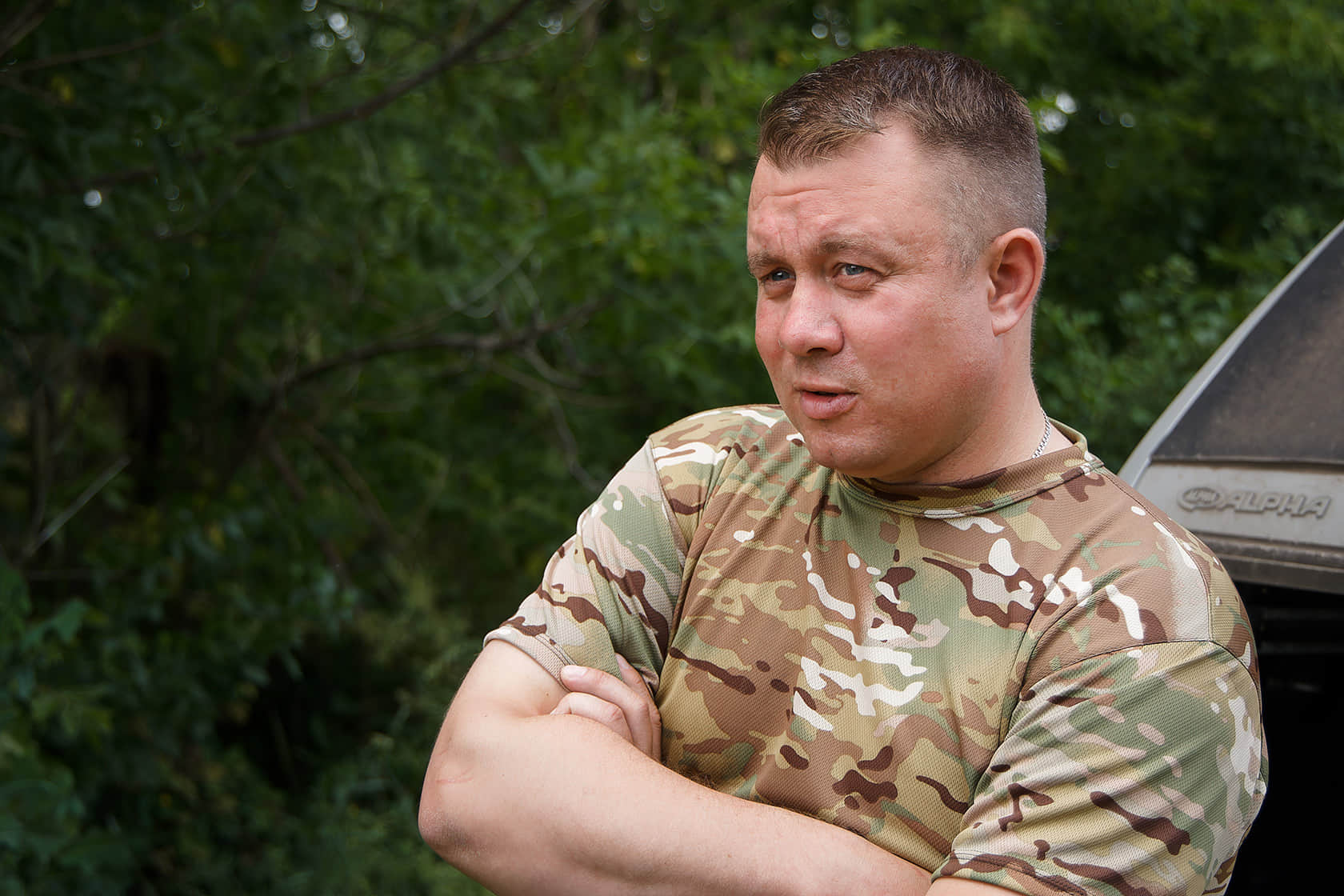
When did this happen? When did the units you were leading leave the city?
The last unit left, I think, on 14 or 15 May, maybe the 16th. We were still occupying [positions – ed.] on the outskirts, and the high-rise buildings were already in the hands of the Russians. The 214th Special Battalion was on the outskirts.
[Wagner Group leader Yevgeny Prigozhin announced the capture of Bakhmut on 20 May 2023 – the Ukrainian Ministry of Defence denied this statement on the same day. On 21 May, President Volodymyr Zelenskyy said that the city had not been completely captured by the Russians – UP.]
Is there a date that is considered to be the date when the defence forces finally withdrew from the city?
It’s you [civilians – ed.] who have to have a date – we just go about the normal life of military units. We carry out our tasks and that's it.
Did Syrskyi give the order to leave Bakhmut?
Syrskyi doesn’t command the units that are here... he is the general leadership. If we are talking about the Khortytsia operational-strategic grouping of troops, Syrskyi gives orders to the commander of the Soledar tactical group, and Soledar manages the tactical groups and military units. The tactical groups give orders to their military units and subunits.
So it was you who gave the order to the 80th and 5th Brigades to leave the city?
Yes, it was me. I got the order from Soledar, Soledar got it from Syrskyi.
Do you think it was a timely decision to leave the city?
We could have got out of Bakhmut earlier. But don't forget that in addition to tactical plans, there are also strategic plans and political decisions. In terms of foreign policy, the success of the Ukrainian Armed Forces in negotiations with our partners can be used as an additional political blow to the Russian Federation.
At this stage, I think everything has been done to crush the enemy's group while maintaining our combat capability. Why can we say this?
Firstly, we immediately launched an offensive and we were successful.
Secondly, we have once again shown that the much-vaunted "world’s second biggest army" is basically a lump of meat incapable of carrying out the tasks set by its leadership.
Thirdly, the favourite Soviet tradition of "taking a city, advancing, and taking some milestone on a day of particular significance" is not working. They were unable to take the city by 9 May, even though they had been aiming to do that for two months.
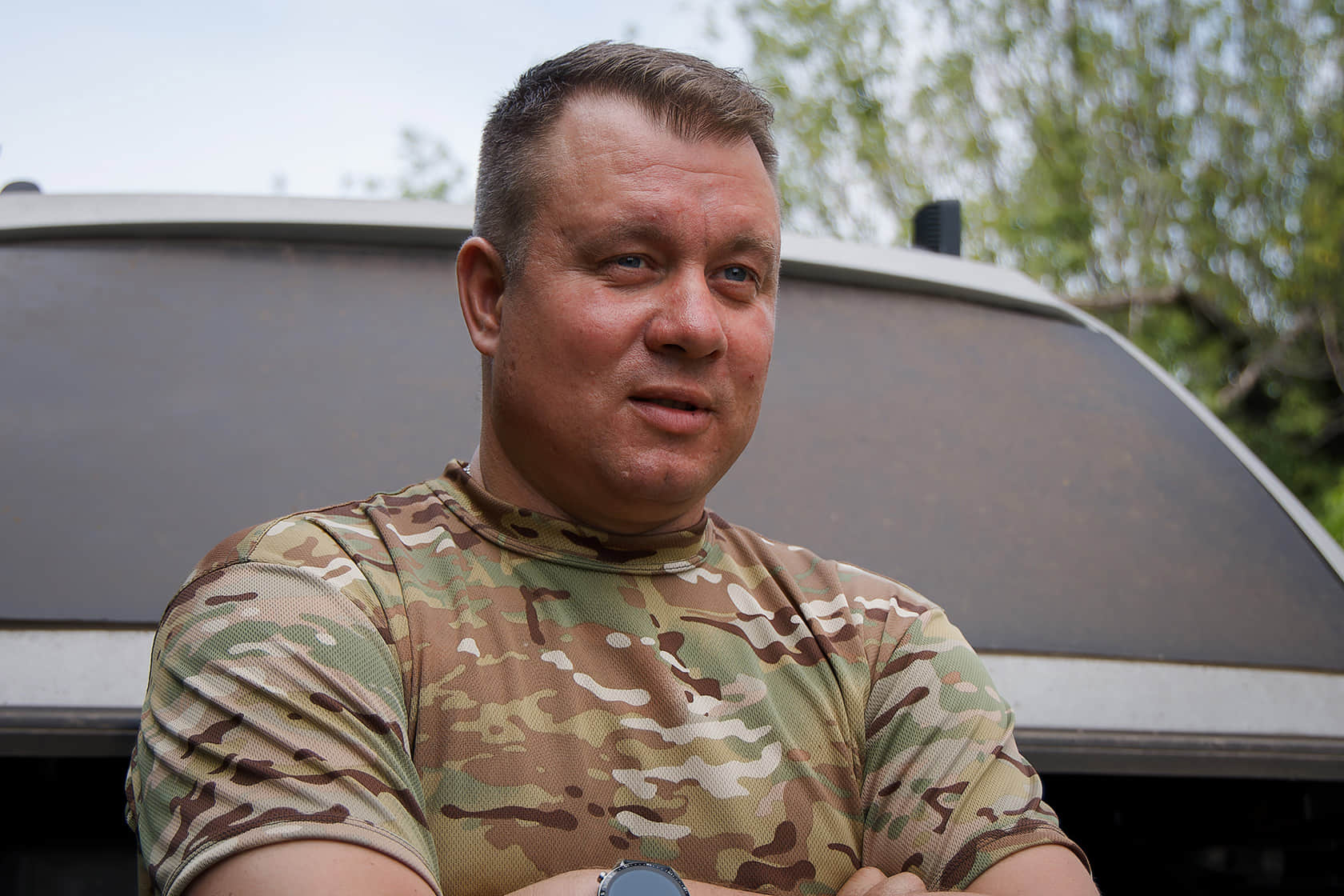
As a military man, you speak quite calmly about the political component of the war...
I’ve been fighting for over nine years; war is normal life to me. To go back to civilian life and not fight... I don't know how I will behave there, or what life is like there. War is our life now.
After hearing those words, I’d like to ask you as a human being: do you want this war to end?
The war? Yes, I do. I don't know what I will do, but I want it to end. I have a lot of friends, people I got to know and discover because of this war, and it has also taken people away.
Let me get back to Bakhmut: was Valerii Zaluzhnyi, Commander-in-Chief of the Armed Forces of Ukraine, involved in planning defensive or offensive actions on the Bakhmut front?
Well, the status of commander-in-chief makes it sound like he should be involved. But to what extent? I’m not involved in the planning of the General Staff at my level.
But you have direct access to the General Staff, don't you?
By the way, I would like to say this: the Commander-in-Chief, the Commander of the Ground Forces, and other commanders are different now - it’s not like the Soviet model. They are more open, and almost any serviceman can contact them.
Obviously not everyone has their phone numbers, but you can talk to them during meetings, award ceremonies, operational planning, as I have seen – everyone can come up and ask questions, even questions that aren’t in their competence.
I would especially say that Zaluzhnyi is the most open person in this regard. I think I could contact him on any matter – not any old matter, but important ones – because I understand the scope and level of tasks he performs.
We were told that he came to the Bakhmut front to see the 3rd Assault Brigade.
He came to see the 3rd and us.
But the media mainly focuses on Syrskyi...
I will say this: the main thing is that the top military and political leadership should create opportunities for these commanders to work together. It shouldn't be a competitive process, but they should be supported in every way. These are the main people!
The majority of society trusts the Commander-in-Chief, while some trust the Commander of the Ground Forces more. In some places, maybe it's the other way round. The Armed Forces trust both. And that’s how it should be.
It's the president's job to suppress attempts to lower one person's rating and raise someone else's. In a state of war, when we are fighting a country that is not weak, so to speak, we need to forget about our ratings and work in the interests of the military.
In that conversation with The New York Times back in March, you had high hopes for the newly created assault units. To quote you, "We’ll delay the enemy here a little longer and let them knock the enemy out." Did the new units enter the Bakhmut front?
Let that be a surprise.
Then I have another question for you: what do you think about the fact that newly formed brigades could become offensive shock troops on some fronts?
Here's my answer: everyone was once newly formed and gaining battle experience.
This is what I'd do: I'd put the newly formed units on the defensive on this front. I'd take those who have combat experience out for recovery and training, and then I'd launch decisive offensive actions with the personnel who understand tactics and know how to fight.
But I repeat: every serviceman and every unit gains experience, and these ones will too. Everything happens in its own time.
I don't think there will be anything too intense in the short term, God willing. But when the Offensive Guard has taken part in the fighting a little and understands how to do it, the result will be much more powerful.
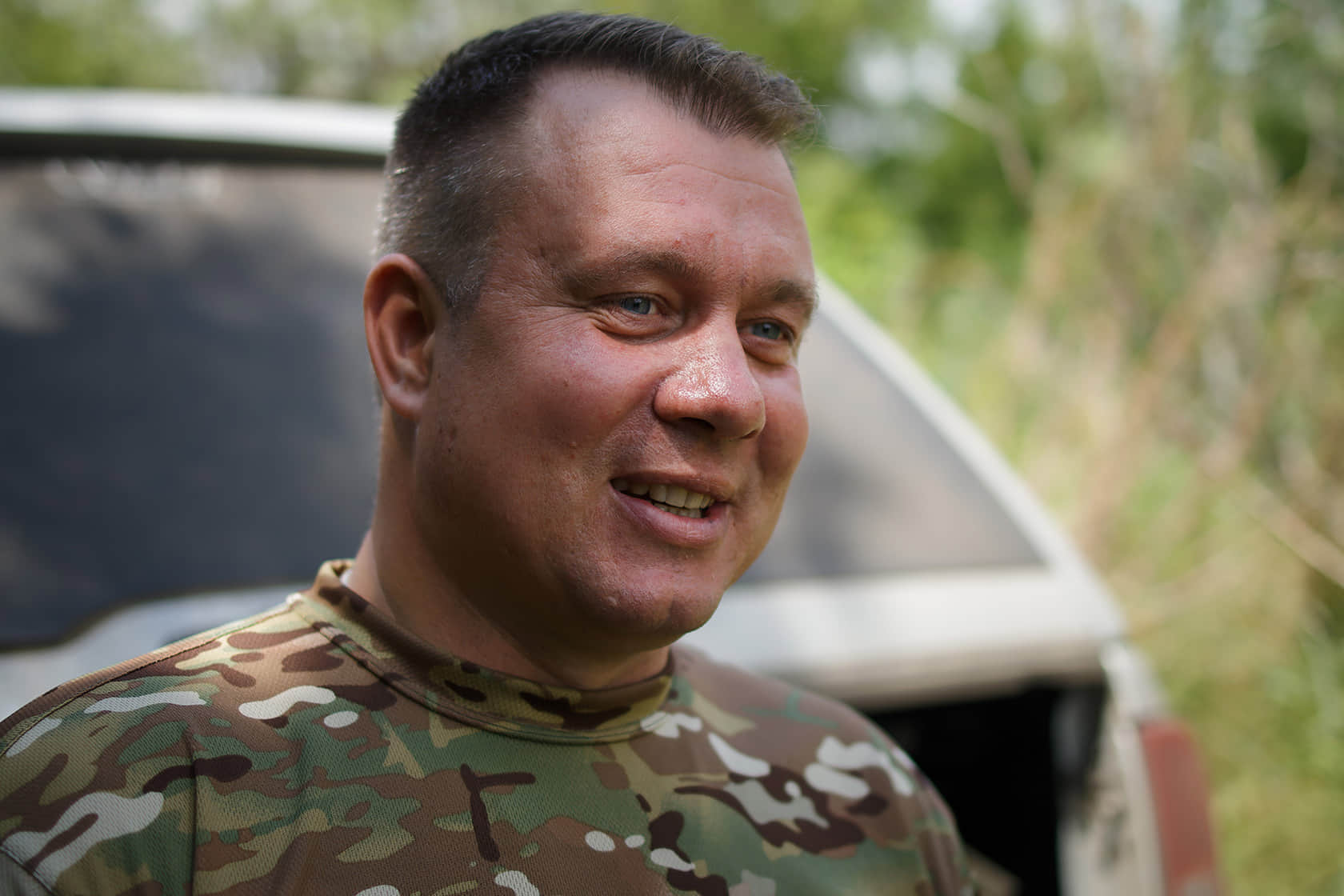
Do you have maximum and minimum expectations for the Ukrainian army’s future major offensive? What territory could the defence forces reach, roughly speaking?
Look, this is what an offensive is... If you take the maximum in an offensive, you have to understand that you could lose a lot of people and equipment. If you plan the minimum, you’ll save more personnel but achieve the minimum result.
I’m not the commander-in-chief, but the task needs a comprehensive approach. If we move forward now, we must proceed with alternating use of forces and equipment.
The Russian forces have been preparing for our offensive for a long time. Some areas need to be covered on foot; there are areas where you need to use vehicles, then walk and stop for logistics. And it's all mined. There’s no such thing as "Off you go then" here. You can do the maximum, but you’ll have huge losses.
Is the idea of reaching the 1991 borders realistic?
Yes, of course. Not now; we can’t just set off and reach them, but gradually – yes. I think this isn’t going to be just a military process, it will be political as well. If we continue to be successful and the enemy suffers losses, this will force them to make political decisions and negotiations to end the war in any event.
I would add that when we get near the borders, we’ll have to launch missile strikes on the territory of Russia. All Russia’s reserves and powerful weapons are located on its own territory. This will make them certain that they have to get out fast.
The full-scale invasion: the path to Mariupol, trophies in Kharkiv Oblast, and a call to join Ukraine's Armed Forces
Until 24 February 2022, people considered the battles for Ilovaisk, Donetsk Airport and Debaltseve the most brutal fighting in the history of independent Ukraine. What events that happened after the full-scale invasion would you add to this list?
We could add any place. Why were those battles considered the most difficult? Because the Russians used regular troops on those fronts on a large scale. Where are they using regular forces now? Everywhere.
The fiercest battles were near Kyiv, Chernihiv, Kharkiv, Mariupol, Bakhmut and Marinka – along the entire front line.
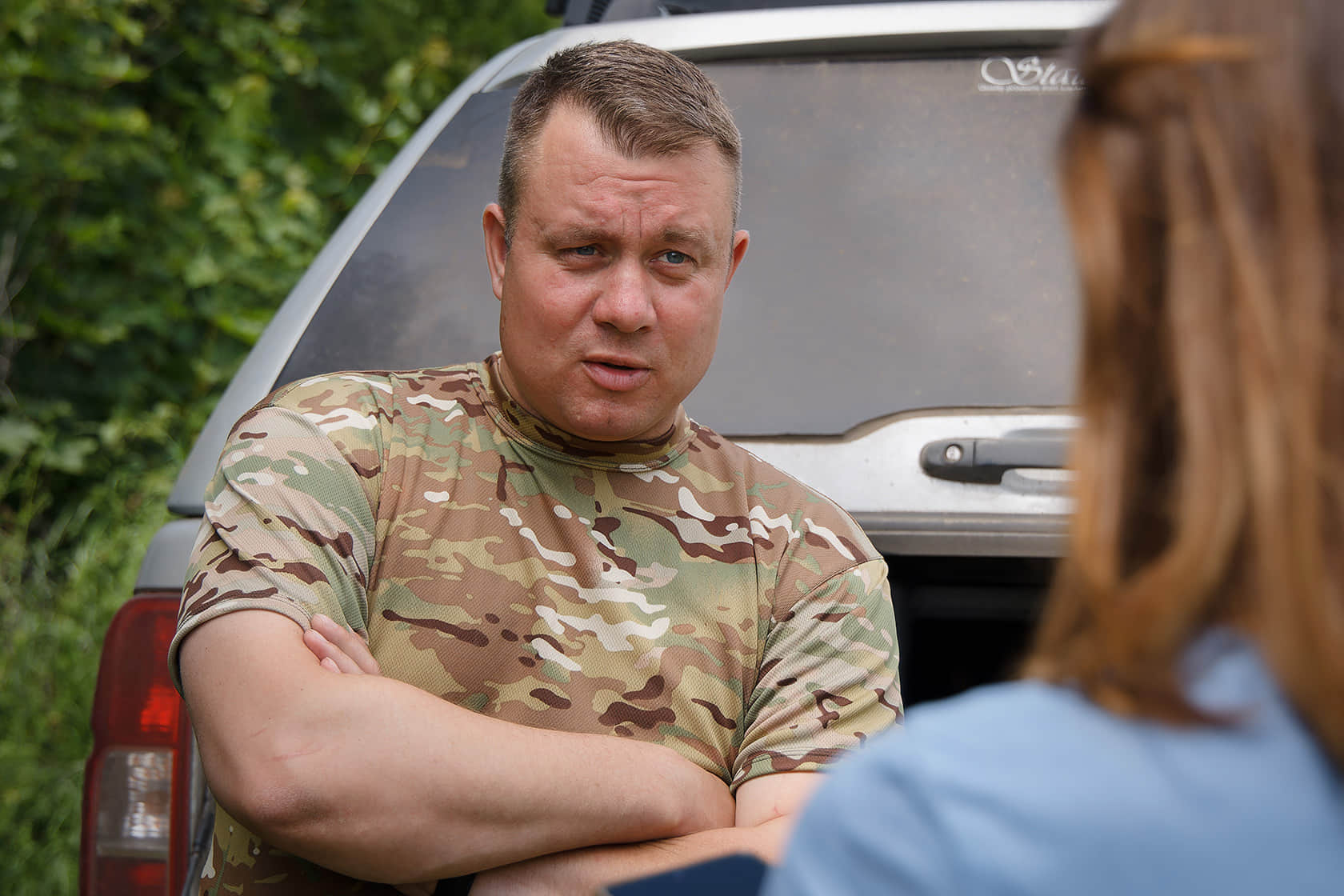
Which place was the most difficult for you?
Near Kyiv, definitely, near Zaporizhzhia, at the first battle of Kharkiv – that was the Belgorod road, in the vicinity of Kozacha Lopan. There we first began to move forward and first shelled Belgorod Oblast with artillery. It was their entry-exit checkpoint, their border posts; then we found their artillery and attacked this place again.
In addition, the Donetsk front was the most difficult. Everywhere.
The great Kharkiv offensive was anticipated to be the most difficult for us. But due to excellent planning and the fact that the enemy, although they expected an offensive, did not expect such a large-scale one, that offensive turned out to be relatively easy.
We liberated a lot of places at that time and collected trophies. We exchanged equipment the way children swap sweet wrappers – who needs a TOR [a Russian anti-aircraft missile system — ed.]? Let's do it like this: we’ll give you a TOR, and you give us an armoured personnel carrier. We lost only one man and we advanced very successfully at that time.
How many tanks did you use during the Balakliia operation?
We had ten tanks, armoured personnel carriers, infantry fighting vehicles, and artillery.
By the way, do you ever get into a tank these days?
No, I don't have time to. The last time I was on the front line was when one unit was failing in Bakhmut. The battalion commander and I set off for the position to help them. We even wanted to go on the offensive with the unit, but there was one sane person who grabbed our legs and said, "No!"
The expression on your face changes when you start talking about tanks, I can see the joy in it. What do you feel when you get into a tank?
I don't know what to compare it to for you. It's almost like hugging a woman – it's like home [he smiles – ed.]. It's hard to describe.
You also mentioned Zaporizhzhia among the most challenging areas; you were one of those who had to go and break the siege of Mariupol. Who suggested you do this?
They didn’t offer me the task itself. The commander of the Ground Forces suggested that I just go to the Zaporizhzhia front to support the unit, but the task had already been determined, in my opinion, by Serhii Naiev [Commander of the Joint Forces] and... another general.
Who was supposed to go and break the siege of Mariupol? The Azov Regiment, or rather its veterans, or your tank crew?
The Azov unit, tank crew and infantrymen who went with me to the Zaporizhzhia front, including Ukraine's Territorial Defence Forces, volunteers, and civilians. Everyone who fought with me in 2014 called and said, "We want to fight. We’ll go wherever you go." That's how it all built up. I had ten men and two tanks to start with...
One of which, as you’ve told journalists, was a training tank?
Yes. Then there were 400 infantrymen and a tank company [10 tanks – ed.]. That means I was already in a powerful team.
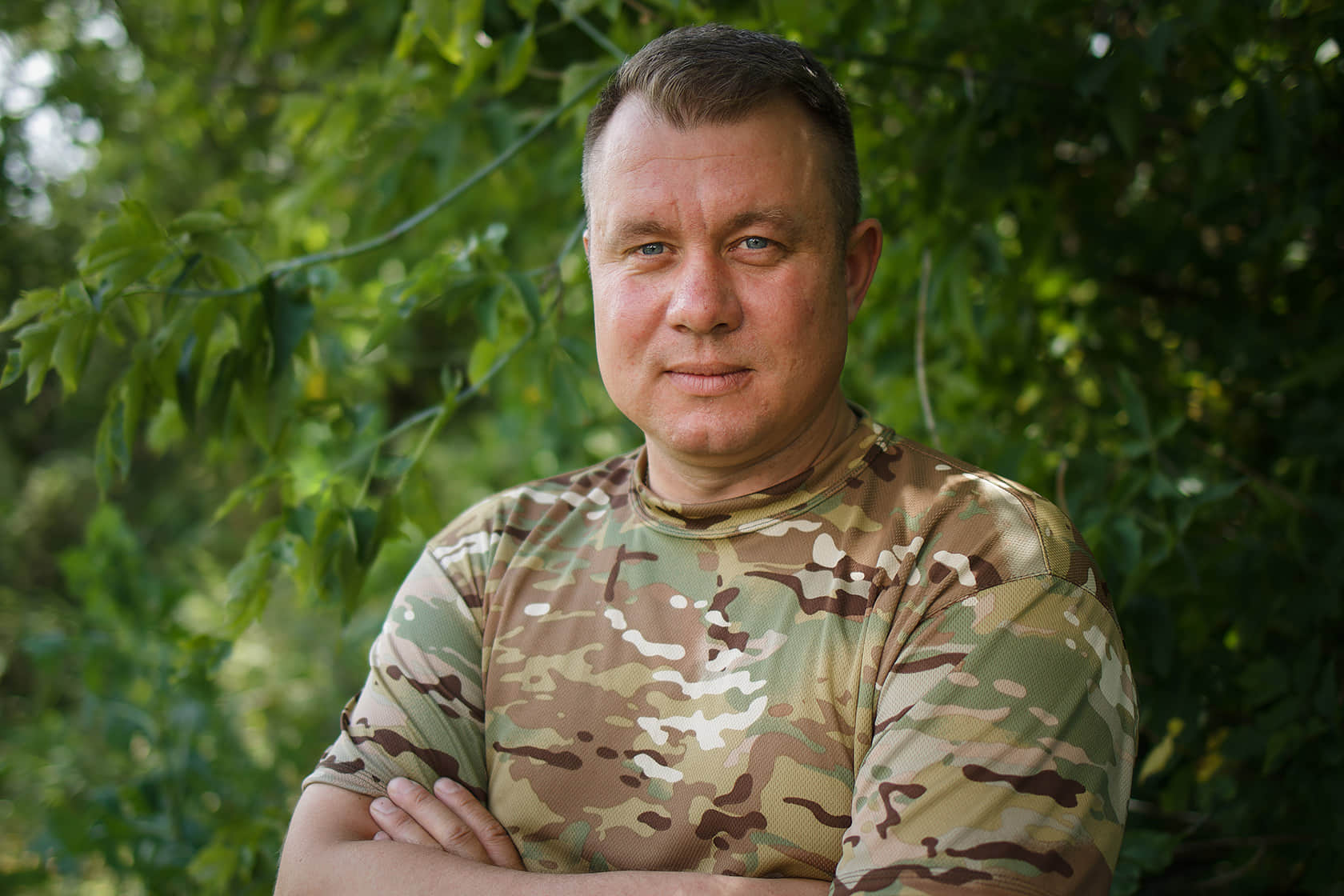
How many people went to break the siege of Mariupol in total?
I don't remember now, but not very many. That’s why I consider the task either ill-conceived, or... In short, there were few of us, and we would not have had the strength or means to reach Mariupol.
Were there 2,000 people, or fewer than that?
Fewer.
When you described breaking the siege of Mariupol to Babel, you said, I believe, some very significant words: "They didn’t seem to believe we would get anywhere. I think they were counting on luck: if it worked out, they’d be given state awards; if it didn’t work out, they wouldn’t be criticised too much because society was demanding that the fighters be released from the encirclement."
Have you faced similar ill-advised decisions on other fronts?
Did I say that [he laughs – UP]? No, there haven’t been any other situations like that. I was allowed to plan myself, so they gave me the task, and I’d already suggested ways of doing it.
And the last question. In an interview with Ukrainska Pravda in 2015, you said that you were surprised that you had to fight with the Russians because in some ways you considered them "your own". What is your opinion about the Russians after nine years of war?
When did I say that - in 2015? I already considered them scum in 2014; nothing has changed in those nine years. The only thing I can add is about Russian civilians who are not fighting but are "far removed from politics" and "don't decide anything".
They’re the same herd of killers [he switches to Russian – UP], only silent ones. As people say, the terrible person is not the one who kills, but the one who is indifferent, because all crimes occur due to their tacit consent.
Therefore, they are even more guilty than the state leadership and the military.
Is there anything else you’d like to add?
Don’t be afraid - join the ranks of the Armed Forces of Ukraine. Don’t bury your head in the sand, don’t attempt to shirk your duty not only to the state, but also to yourself, your family and your ancestors.
You should work not just through words, donations, and actions in the rear. Sometimes you have to go to the enlistment office on your own, show that you’re there, and tell them what you want and what you can do. It's scary, but it's necessary.
Olha Kyrylenko for Ukrainska Pravda
Photo – Dmytro Larin, Ukrainska Pravda
Translation: Yelyzaveta Khodatska, Myroslava Zavadska and Tetiana Buchkovska
Editing: by Teresa Pearce